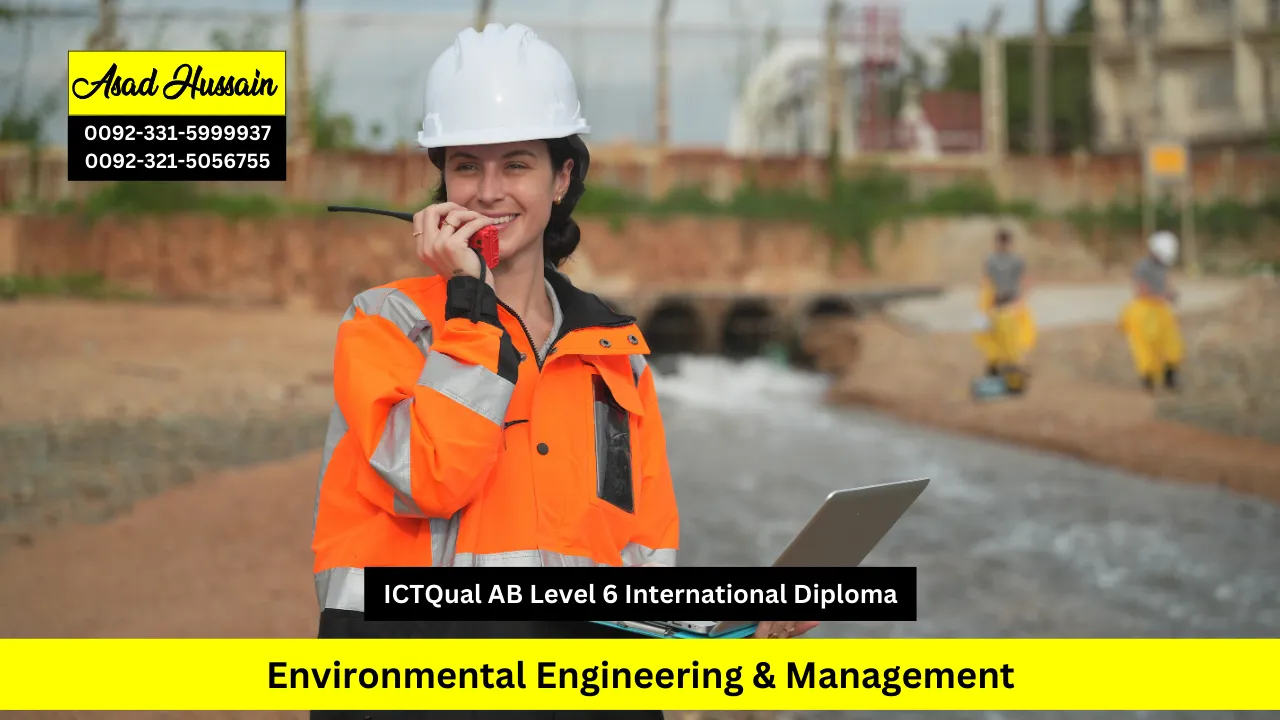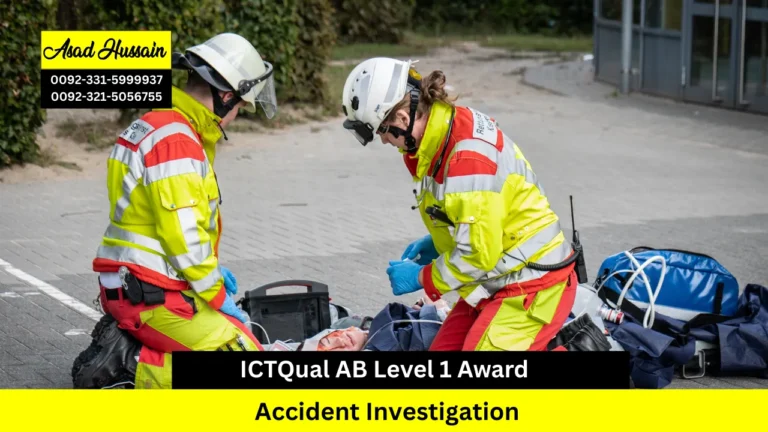In today’s rapidly evolving world, sustainable development and environmental management have become critical priorities for industries, governments, and organizations worldwide. The ICTQual AB Level 6 International Diploma in Environmental Engineering & Management equips professionals with advanced knowledge and practical skills to address complex environmental challenges, implement sustainable solutions, and ensure compliance with global environmental standards.
This comprehensive program is designed for individuals seeking to specialize in environmental engineering, sustainability practices, and environmental management systems. Learners will explore topics such as pollution control, waste management, renewable energy, environmental impact assessment, and sustainability strategies. Through a combination of theoretical instruction, case studies, and real-world projects, participants will gain the expertise to design, implement, and manage environmentally responsible solutions in diverse industrial and organizational contexts.
ICTQual ABLevel 6 International Diploma in Environmental Engineering & Management will be prepared for professional roles such as Environmental Engineer, Sustainability Consultant, Compliance Manager, and Environmental Project Coordinator. The ICTQual ABLevel 6 International Diploma in Environmental Engineering & Management emphasizes practical applications, enabling learners to make informed, evidence-based decisions that enhance operational efficiency while minimizing environmental impact.
This British Council verifiable, MOFA and Embassy attestable certification is globally recognized, making it ideal for professionals looking to advance their careers in environmental management, sustainability, and engineering. Whether you are entering the field or seeking to formalize and expand your expertise, this diploma provides the tools, knowledge, and strategic understanding required to excel in today’s environmentally conscious industrial landscape.
Program Highlights
Study Units
Year 1 – Foundation of Environmental Engineering & Management
- Principles of Environmental Engineering
- Introduction to Environmental Science and Sustainability
- Environmental Legislation and Regulatory Compliance
- Environmental Impact Assessment (EIA) Fundamentals
- Waste Management and Pollution Control
- Water Quality Management and Treatment
- Air Quality Monitoring and Control
- Soil and Groundwater Protection
- Renewable Energy Systems and Applications
- Occupational Health, Safety, and Environmental Awareness
- Communication and Reporting in Environmental Management
- Professional Ethics and Responsibility in Environmental Practice
Year 2 – Applied Environmental Engineering & Management
- Advanced Environmental Risk Assessment
- Industrial Wastewater and Effluent Management
- Solid and Hazardous Waste Engineering
- Environmental Monitoring and Audit Techniques
- Sustainable Resource Management and Conservation
- Climate Change Mitigation and Adaptation Strategies
- Environmental Modelling and Data Analysis
- Green Building and Sustainable Infrastructure
- Environmental Management in Manufacturing and Energy Sectors
- Behavioural and Organisational Approaches to Environmental Safety
- Digital Tools and Technologies in Environmental Engineering
- Research Methods and Environmental Project Planning
Year 3 – Strategic Environmental Leadership & Management
- Strategic Environmental Management and Governance
- Integrated Environmental Management Systems (ISO 14001, ISO 50001)
- Environmental Policy Development and Implementation
- Sustainability Leadership and Corporate Social Responsibility (CSR)
- Environmental Risk Management in Large-Scale Projects
- Renewable Energy Project Management
- International Environmental Standards and Best Practices
- Environmental Innovation and Emerging Technologies
- Environmental Crisis Management and Emergency Planning
- Advanced Occupational Health & Environmental Wellbeing Strategies
- Independent Research Project in Environmental Engineering
- Capstone Project: Applied Environmental Engineering & Management
To ensure that learners gain the maximum benefit from the ICTQual AB Level 6 International Diploma in Industrial Safety & Risk Management, applicants must meet specific entry requirements. These requirements are designed to confirm that participants have the foundational knowledge, practical experience, and language proficiency necessary to successfully complete this advanced program.
Age Requirements
- Applicants must be at least 18 years old, to enrool in ICTQual ABLevel 6 International Diploma in Environmental Engineering & Management.
- Younger candidates with significant professional experience in industrial safety may be considered on a case-by-case basis.
Educational Requirements
- A minimum of a Level 5 qualification or equivalent in Occupational Health & Safety, Industrial Safety, Engineering, or related fields is required.
- Candidates with relevant vocational training or diplomas in Industrial Safety, Risk Management, or Health & Safety will also be considered.
Professional Experience
- At least 2 years of work experience in industrial safety, risk assessment, or related operational roles is highly recommended.
- Experience in supervisory or managerial positions within industrial, manufacturing, or construction environments strengthens the application.
English Language Proficiency
- Applicants must demonstrate proficiency in English through qualifications such as IELTS 5.5+, TOEFL, or equivalent, ensuring effective comprehension of course materials.
- Candidates with work experience in English-speaking industrial environments may be considered without formal language testing.
Meeting these entry requirements ensures that learners are fully prepared to engage with the course content, participate in practical projects, and successfully achieve the globally recognized ICTQual AB Level 6 certification, enhancing career opportunities in industrial safety and risk management.
The ICTQual AB Level 6 International Diploma in Environmental Engineering & Management equips learners with comprehensive knowledge, technical skills, and strategic competencies to manage environmental projects, implement sustainable engineering solutions, and lead initiatives in environmental protection and sustainability. The program combines theory, applied practice, and leadership skills to prepare graduates for careers in environmental consulting, engineering, and sustainability management.
Year 1 – Foundation of Environmental Engineering & Management
Principles of Environmental Engineering
- Understand core principles and methodologies in environmental engineering.
- Apply engineering concepts to solve environmental challenges.
- Evaluate engineering solutions for environmental sustainability using measurable criteria.
Introduction to Environmental Science and Sustainability
- Explain the scientific basis of environmental systems and sustainability concepts.
- Apply sustainable practices to environmental engineering projects.
- Assess environmental outcomes using measurable indicators.
Environmental Legislation and Regulatory Compliance
- Identify national and international environmental laws and regulations.
- Apply compliance requirements to operational and engineering practices.
- Evaluate adherence to regulatory standards using measurable outcomes.
Environmental Impact Assessment (EIA) Fundamentals
- Conduct basic environmental impact assessments for projects.
- Apply EIA frameworks to identify potential environmental risks.
- Evaluate mitigation strategies using measurable environmental criteria.
Waste Management and Pollution Control
- Implement strategies for waste reduction, treatment, and disposal.
- Apply pollution control techniques for air, water, and soil.
- Assess effectiveness of waste and pollution control measures using measurable metrics.
Water Quality Management and Treatment
- Monitor and analyze water quality parameters.
- Apply treatment methods to ensure safe and sustainable water use.
- Evaluate water management practices against regulatory and environmental standards.
Air Quality Monitoring and Control
- Measure and analyze air pollutants using scientific techniques.
- Apply air quality control methods to industrial and urban environments.
- Assess control effectiveness using measurable standards.
Soil and Groundwater Protection
- Implement strategies for soil and groundwater conservation.
- Apply remediation techniques for contaminated sites.
- Evaluate outcomes of protection and remediation initiatives.
Renewable Energy Systems and Applications
- Understand principles and technologies of renewable energy systems.
- Apply renewable solutions to reduce environmental impact.
- Evaluate energy integration effectiveness using measurable metrics.
Occupational Health, Safety, and Environmental Awareness
- Identify health, safety, and environmental risks in engineering operations.
- Apply safety protocols to mitigate risks.
- Evaluate effectiveness of safety measures using measurable criteria.
Communication and Reporting in Environmental Management
- Develop strategies for effective environmental communication.
- Apply reporting standards for projects and regulatory compliance.
- Assess communication and reporting effectiveness.
Professional Ethics and Responsibility in Environmental Practice
- Apply ethical principles in environmental decision-making.
- Ensure accountability in engineering and management practices.
- Evaluate compliance with ethical and professional standards.
Year 2 – Applied Environmental Engineering & Management
Advanced Environmental Risk Assessment
- Identify and quantify environmental risks using advanced techniques.
- Apply mitigation strategies to minimize risks.
- Assess effectiveness of risk management plans using measurable standards.
Industrial Wastewater and Effluent Management
- Implement wastewater treatment techniques in industrial settings.
- Apply effluent monitoring and compliance strategies.
- Evaluate treatment efficiency using measurable metrics.
Solid and Hazardous Waste Engineering
- Design and apply solutions for safe solid and hazardous waste management.
- Implement regulatory and safety protocols.
- Assess operational performance using measurable standards.
Environmental Monitoring and Audit Techniques
- Conduct environmental audits and monitoring programs.
- Apply data analysis to assess compliance and performance.
- Evaluate audit results and implement improvements.
Sustainable Resource Management and Conservation
- Apply strategies for efficient use of water, energy, and materials.
- Implement conservation techniques in industrial and community settings.
- Assess resource efficiency using measurable indicators.
Climate Change Mitigation and Adaptation Strategies
- Develop strategies to reduce carbon footprint and enhance resilience.
- Apply mitigation and adaptation measures in projects.
- Evaluate environmental impact using measurable standards.
Environmental Modelling and Data Analysis
- Use modelling techniques to predict environmental outcomes.
- Analyze data to support decision-making.
- Evaluate model accuracy and practical application effectiveness.
Green Building and Sustainable Infrastructure
- Apply sustainable engineering principles to building and infrastructure projects.
- Implement energy-efficient and low-impact design solutions.
- Assess performance against environmental and regulatory standards.
Environmental Management in Manufacturing and Energy Sectors
- Implement environmental strategies in industrial and energy operations.
- Apply sustainable practices to optimize efficiency and reduce impact.
- Evaluate operational outcomes using measurable performance metrics.
Behavioural and Organisational Approaches to Environmental Safety
- Promote a culture of environmental responsibility within organizations.
- Apply behavioral strategies to improve safety and compliance.
- Assess effectiveness using measurable indicators.
Digital Tools and Technologies in Environmental Engineering
- Utilize digital technologies for environmental monitoring and management.
- Apply software and tools for data analysis and operational optimization.
- Evaluate effectiveness of digital applications.
Research Methods and Environmental Project Planning
- Conduct applied research for environmental engineering projects.
- Plan and execute sustainability-focused projects.
- Evaluate project outcomes using measurable environmental and operational standards.
Year 3 – Strategic Environmental Leadership & Management
Strategic Environmental Management and Governance
- Develop strategic plans for environmental management in organizations.
- Apply governance frameworks for compliance and efficiency.
- Assess strategic outcomes using measurable performance indicators.
Integrated Environmental Management Systems (ISO 14001, ISO 50001)
- Implement integrated environmental and energy management systems.
- Apply ISO standards to operational and strategic processes.
- Evaluate compliance and system effectiveness using measurable metrics.
Environmental Policy Development and Implementation
- Develop policies to drive environmental sustainability initiatives.
- Apply policies to operations, projects, and governance.
- Assess policy impact using measurable performance criteria.
Sustainability Leadership and Corporate Social Responsibility (CSR)
- Lead sustainability initiatives and CSR projects effectively.
- Apply strategic thinking to enhance environmental responsibility.
- Evaluate leadership impact on sustainability performance.
Environmental Risk Management in Large-Scale Projects
- Identify, assess, and mitigate risks in large environmental projects.
- Apply strategic risk management frameworks.
- Evaluate effectiveness using measurable standards.
Renewable Energy Project Management
- Plan and manage renewable energy projects effectively.
- Integrate sustainable energy solutions in operations.
- Evaluate project success using measurable energy and environmental metrics.
International Environmental Standards and Best Practices
- Apply global environmental standards and frameworks.
- Benchmark organizational practices against international best practices.
- Assess compliance and performance using measurable indicators.
Environmental Innovation and Emerging Technologies
- Implement innovative technologies to enhance environmental performance.
- Apply new solutions for waste management, energy efficiency, and sustainability.
- Evaluate effectiveness and impact using measurable criteria.
Environmental Crisis Management and Emergency Planning
- Develop plans for environmental crisis response and management.
- Apply emergency protocols in practical scenarios.
- Assess response effectiveness using measurable performance standards.
Advanced Occupational Health & Environmental Wellbeing Strategies
- Implement advanced health, safety, and wellbeing programs for environmental projects.
- Apply proactive strategies to prevent accidents and environmental harm.
- Evaluate program outcomes using measurable metrics.
Independent Research Project in Environmental Engineering
- Conduct independent research on contemporary environmental engineering challenges.
- Apply analytical and problem-solving skills to practical issues.
- Present findings professionally using measurable standards.
Capstone Project: Applied Environmental Engineering & Management
- Integrate knowledge, skills, and competencies from all units into a comprehensive applied project.
- Apply strategic, operational, and leadership competencies to solve real-world environmental challenges.
- Evaluate project success using measurable performance and sustainability indicators.
Upon completion, learners will possess advanced technical knowledge, practical skills, and leadership competencies to manage environmental projects, implement sustainable engineering solutions, and drive global sustainability initiatives effectively.
The ICTQual AB Level 6 International Diploma in Environmental Engineering & Management is designed for a diverse range of learners who aim to acquire advanced knowledge and practical skills in environmental engineering, sustainability, and regulatory compliance. ICTQual ABLevel 6 International Diploma in Environmental Engineering & Management caters to individuals who seek to lead environmental initiatives, implement sustainable solutions, and influence environmental policies across industries and organizations.
Educational Instructors and Trainers
- Professionals teaching environmental science, engineering, or sustainability can enhance their curriculum with up-to-date knowledge on global environmental practices.
- Gain skills to design and deliver practical, industry-relevant training programs for students and professionals.
Environmental Advocates and Activists
- Individuals promoting environmental protection and sustainability initiatives will learn how to implement practical strategies to reduce industrial and organizational environmental impact.
- Acquire expertise in monitoring, reporting, and influencing environmental compliance and corporate responsibility programs.
Students and Recent Graduates
- Learners seeking careers in environmental engineering, sustainability, or compliance will gain a strong foundation of knowledge and practical skills.
- Develop competencies that enhance employability and prepare graduates for professional roles such as Environmental Engineer, Sustainability Consultant, or Compliance Officer.
Career Changers
- Professionals looking to transition into environmental management or sustainability roles will acquire the knowledge and practical skills required to excel in a new career path.
- Learn to assess environmental risks, implement management systems, and promote sustainable practices in industrial and organizational settings.
Policy Makers and Regulators
- Individuals involved in developing, enforcing, or advising on environmental policies will gain insight into best practices, regulatory frameworks, and compliance strategies.
- Build the ability to evaluate and improve environmental legislation and corporate compliance standards effectively.
This diploma ensures that learners—from educators and activists to students, career changers, and regulators—acquire the technical expertise, practical skills, and strategic understanding required to lead environmental initiatives, implement sustainable solutions, and foster compliance with global environmental standards.







